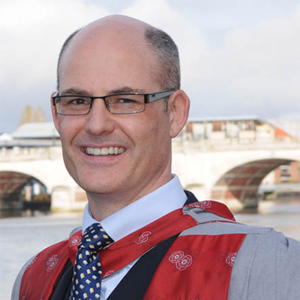
By EDI Committee Member Nicholas Freestone
Nick Freestone is an Associate Professor at Kingston University and has a long-held interest in the pedagogical aspects of academic practice. He was the education theme lead, and since has been involved in raising the profile of learning and teaching as a pathway for career progression and promotion. He has also offered mentoring for colleagues in the often bewildering and foreign world of pedagogy for those interested in examining more closely the learning and teaching parts of their academic lives.
As part of our Faces of Physiology Series, we spoke to Dr Nick Freestone to find out more about the proudest moments of his career so far, what makes him unique, as well as how he’s fighting against injustice and inequity.
What are you most proud of in your career so far?
Getting my undergraduate courses shortlisted for the Guardian Education award for “Course Design, retention and Student Outcomes”. I’m also pleased to have been awarded a few personal prizes at my institution (Most Innovative Lecturer, Provost’s Prize for Learning and Teaching Excellence, Best Assessment and Feedback Award) as well as nationally (RSB’s Higher Education Bioscience Teacher of the Year and a National Teaching Fellowship). Hopefully, this means I am doing something worthwhile for my students. Along the way I also managed to remove the awarding gap for all identifiable demographic sub-groups in my course outcomes. This led to me being co-chair of the RSB’s “Bridging Awarding Gaps in the Biosciences” network that seeks to provide colleagues with practical tips and institutions, strategies to reduce and remove awarding gaps.
What challenges have you overcome to get to where you are?
Poor A levels and a slow start getting to grips with the habits necessary to undertake worthwhile research. So personal inadequacy probably! I was therefore fortunate to do most of my PhD research with a marvellous man called Dr Roland Vetter in a research institute in the far north-east corner of Berlin just after the Berlin Wall had fallen. Without his support, mentorship and guidance I would never be where I am today.
Why is EDI important to you?
All my life I have tried to do my little bit to fight against injustice and inequity. I came from a very working class background in a poor neighbourhood in Cardiff. I was the first in my family to go to HE and I have faced some of the barriers that my students face now. Thus with my exceedingly diverse students I am able to show empathy, if not a complete understanding of their sometimes difficult personal circumstances and the innumerable barriers they face to reach their maximum potential. Consequently, students know that I am on their side and that I will fight for them. Whilst this has sometimes brought me into conflict with university management I am happy to be unpopular to do the right thing.
What are your hopes for the future of the physiology community?
For it to be a friendly, welcoming, warm and supportive, collegial and collaborative environment that reassures members new and old that they have a voice and a place in the community. That there are resources that anyone can tap into to help them in their practice, whether that is teaching or research. I think we need to be urging for more institutional change though – there are still gender, disability and ethnic pay gaps in our discipline. The physiological community could play its part by advocating for under-represented colleagues to give them the external validation that they may use to progress in their own working environments.
What makes you unique?
At a whimsical level the ability to remember students’ names amongst the hundreds that I teach. This initially provokes puzzlement but then appreciation amongst students. They feel “seen” and their needs recognised by this simple trick.
Who is your biggest role model and why?
Roland Vetter. He showed me that working hard in the laboratory could be fun, rewarding and worthwhile, whilst always expecting high standards.
These are the faces of physiology. Help us see the full picture — complete our EDI survey this autumn to help shape the future of an inclusive community.
We’re always looking to celebrate our members and their stories. If you would like to share your story with us, please contact membership@physoc.org.

